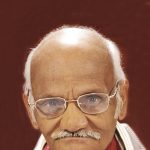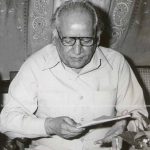Har dehleez pe hai chiraagh…
This year people gave expression to their faith in non-violence by lighting a lamp at their door step exactly at 17.17 hours on 30th January in memory of the exact date and time that Mohandas Karamchand Gandhi was assassinated 66 years ago. The light a lamp campaign is part of Dr. Alok Bajpai’s on going multimedia interaction with the mahatma. Bajpai is author, An Hour with the Mahatma and member GandhiTopia, an online meeting place for Gandhians.
In an exclusive to the Lucknow Observer, Bajpai evokes memories of how Lucknow sees Gandhi. The fire of 1857 had turned into the amber ash. The Nawab of Awadh was gone but Lucknow remained the quintessential city of culture, tehzeeb and zubaan. It was also home of both Hindu and Muslim communities. The Lucknow pact signed between the Muslim League and Congress at the 1916 Congress session here was a fitting tribute to the city’s united population.
The session had played host to moderates and extremists forces alike including the suave Mohammed Ali Jinnah and the unsure yet eager Jawaharlal Lal Nehru meeting for the first time.
If history can be traced to the confluence of time, space and people, Congress’ Lucknow meet is one such point. It was witness to great bonhomie between members of two communities even as it brought all major players who went on to decide the fate of the Indian subcontinent in the future. The trigger of creating history amongst the 2500 odd delegates was one man found on the fringe of the week long meet. Dressed in traditional Kathiawadi dress, he had won some admires.
Writes Nehru in his autobiography: My first meeting with Gandhi was about the time of Lucknow congress during the Christmas, 1916. All of us admired him for his heroic fight in South Africa, but he seemed very distant and different and unpolitical to many of us young men. He refused to take part in Congress or national politics then and confined himself to the South African Indian question.
Mohandas Karamchand Gandhi had already been addressed as a mahatma by a farmer from Gujrat’s Jetpur’s city although he was yet to attain the mahatmahood associated with him, later. What is worth remembering in retrospect is that he made his short speech that day in Lucknow in Hindustani. In Lucknow, the center of refined Urdu and Hindustani, Gandhi had the courage to speak in his faltering Hindi. Listening to his crude Hindi someone in the audience suggested that he switch to English. Never to be defeated he promised to address the Congress session next year in Hindi which he did. The student in him kept learning throughout life, the last lesson being in Bangla on 30th January 1948.
It was not only the vacillating history of communal harmony that awaited its fate till 1947 but also the process and value system that was about to change.
Rajkumar Shukla, a peasant from Bihar already has a slot in history for persuading Gandhi to visit Champaran. Shukla had requested Congress leaders during the Lucknow session to keep in mind the plight of farmers in Champaran but none had shown patience for such mundane issues. Gandhi had probably appeared more native to Shukla than other Anglicized leaders. He asked a Vakil Babu to explain to him the intricacies of the teenkatiya system.
Writes Gandhi in his autobiography: This man caught hold of me at Lucknow, where I had gone for the Congress of 1916. ‘Vakil Babu will tell you everything about our distress,’ he said, and urged me to go to Champaran. ‘Vakil Babu’ was none other than Babu Brajkishore Prasad, who became my esteemed co-worker in Champaran, and who is the soul of public work in Bihar. Rajkumar Shukla brought him to my tent. He was dressed in a black alpaca achkan and trousers. Brijkishore Babu failed then to make an impression on me. I took it that he must be some vakil exploiting simple agriculturists. Having heard from him something of Champaran, I replied as was my wont: ‘I can give no opinion without seeing the condition with my own eyes. You will please move the resolution in the Congress, but leave me free for the present.’
Rajkumar Shukla of course wanted some help from the Congress. Babu Brajkishore Prasad moved the resolution, expressing sympathy for the people of Champaran, and it was unanimously passed.
Rajkumar Shukla was glad, but far from satisfied. He wanted me personally to visit Champaran and witness the miseries of the ryots there. I told him that I would include Champaran in the tour which I had contemplated and give it a day or two. ‘One day will be enough,’ said he, ‘and you will see things with your own eyes.’
From Lucknow I went to Cawnpore. Rajkumar Shukla followed me there.
‘Champaran is very near here. Please give a day,’ he insisted.’ Pray excuse me this time. But I promise that I will come,’ said I, further committing myself.
I returned to the Ashram. The ubiquitous Rajkumar was there too. ‘Pray fix the day now’, he said.’Well,’said I,’I have to be in Calcuttaon such and such a date, come and meet me then, and take me from there.’ I did not know where I was to go, what to do, what things to see.
Before I reached Bhupen Babu’s place in Calcutta, Rajkumar Shukla had gone and established himself there. Thus this ignorant, unsophisticated but resolute agriculturist captured me. What followed in Champaran changed not only Gandhi’s perspective but iinfused new life in the masses as well as the classes already in Gandhi’s fold.
Acharya Kriplani, Nehru, Rajendra Prasad and Mahadev Desai became Gandhi’s lifelong companions. Gandhi kept coming to Lucknow during his crisscross travels around India. He was by the side of his erstwhile friend Motilal Nehru when he passed away in Lucknow in February 1931. In fact Pandit Motilal’s cremation in Allahabad was delayed because the car bringing his wife and Gandhi from Lucknow met with an accident on the highway. The car went into a ditch but Gandhi was unhurt.
Independence brought partition in its wake. Hindu Muslim relationship became fragile as Jinnah and Nehru clashed, but the man who witnessed the Lucknow pact walked the talk as none other did. For that brave front he paid with his life.
The desire of Gandhi was for a united India. He envisaged a different Swaraj in 1909, a civilizational change and attempted to be part of it too. Ever since his assassination more than six decades ago, some of us have chosen a road different to Gandhi’s.




